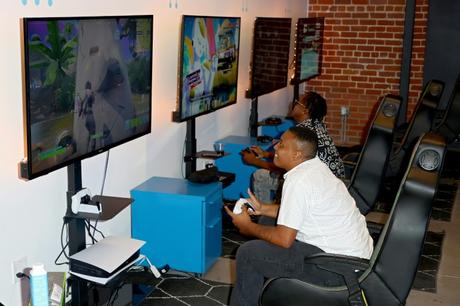
At the height of the pandemic, video games offered people solace in isolation. But now that life is slowly returning to pre-crisis normal and inflation is soaring, gaming companies are feeling the pinch.
Makers of gaming consoles, accessories and software are feeling the same kind of post-pandemic effect as tech titans who saw their business boom as Covid-19 fears kept people close to home .
The pressure has been exacerbated by high inflation that has driven belt-tightening and game fatigue after years of relying on indoor entertainment.
At the start of the pandemic, "people flocked to Twitch in droves - streamers and viewers," said Brandon Williams, who goes by the handle "BWpaco" on the Amazon-owned platform where gamers stream action. of video games.
"But I've spoken to quite a few people who have stopped streaming because they've burned out or it's not for them," the 30-year-old streamer added.
"Or, they haven't had time since they went back to work in person."
Twitch's viewership that skyrocketed during the pandemic has declined but remains higher than it was in 2019, according to twitchtracker.com.
- Games still in progress -
Matt Piscatella, an analyst with market research group NPD, estimated the US will spend around $55.5 billion on games in total this year, down from last year but still up 28% compared to the pre-pandemic year of 2019.
US video game giant Activision Blizzard, which Microsoft is in the process of buying, reported that sales in the first half of this year declined as gamers spent less time in its powerful "Call of Duty" franchise.
Nvidia, the California-based maker of high-performance graphics cards popular with gamers, recently issued a profit warning due to "decline in video game revenue".
Even spending on mobile games is showing signs of weakening, analysts say.
"Rising prices in everyday spending categories such as food and gas, the return of experiential spending such as travel and attending live events, a lighter release slate of new games, and restraints Continued supply of next-gen console hardware all likely contributed to the observed decline. in the second quarter," Piscatella said.
Omdia analyst Steven Bailey said the delayed releases of highly anticipated titles such as "Starfield" and "Suicide Squad" also contributed to a " correction " from the pandemic boom that was inevitable.
- On the lookout -
The boost that new titles give to video game sales is a wildcard likely to benefit the industry in the future, as gamers typically flock to get their hands on hot releases.
Piscatella expressed hope that the video game market will stabilize over the coming year and then return to steady growth.
The rising cost of living due to inflation is forcing players to make choices with their money, but that doesn't mean they're giving up gambling, the analyst noted.
More than three-quarters of US consumers play video games, and subscription services such as Xbox Game Pass and PlayStation Plus help keep costs down, Piscatella said.
The effects of the pandemic on gaming have extended beyond the economic realm, giving rise to a trend among gamers to seek out "comfort games" that emphasize cooperation rather than competition.
The explosion of Nintendo's "Animal Crossing" community-building game is an example of this phenomenon, with players coming together to bring virtual towns to life.
And, according to streamer BWpaco, viewers listen to Twitch channels like they would a radio show while their attention is elsewhere.
"They're just hiding," the streamer said.
"I feel now that things have reopened and people are busier, they have it as background noise."

